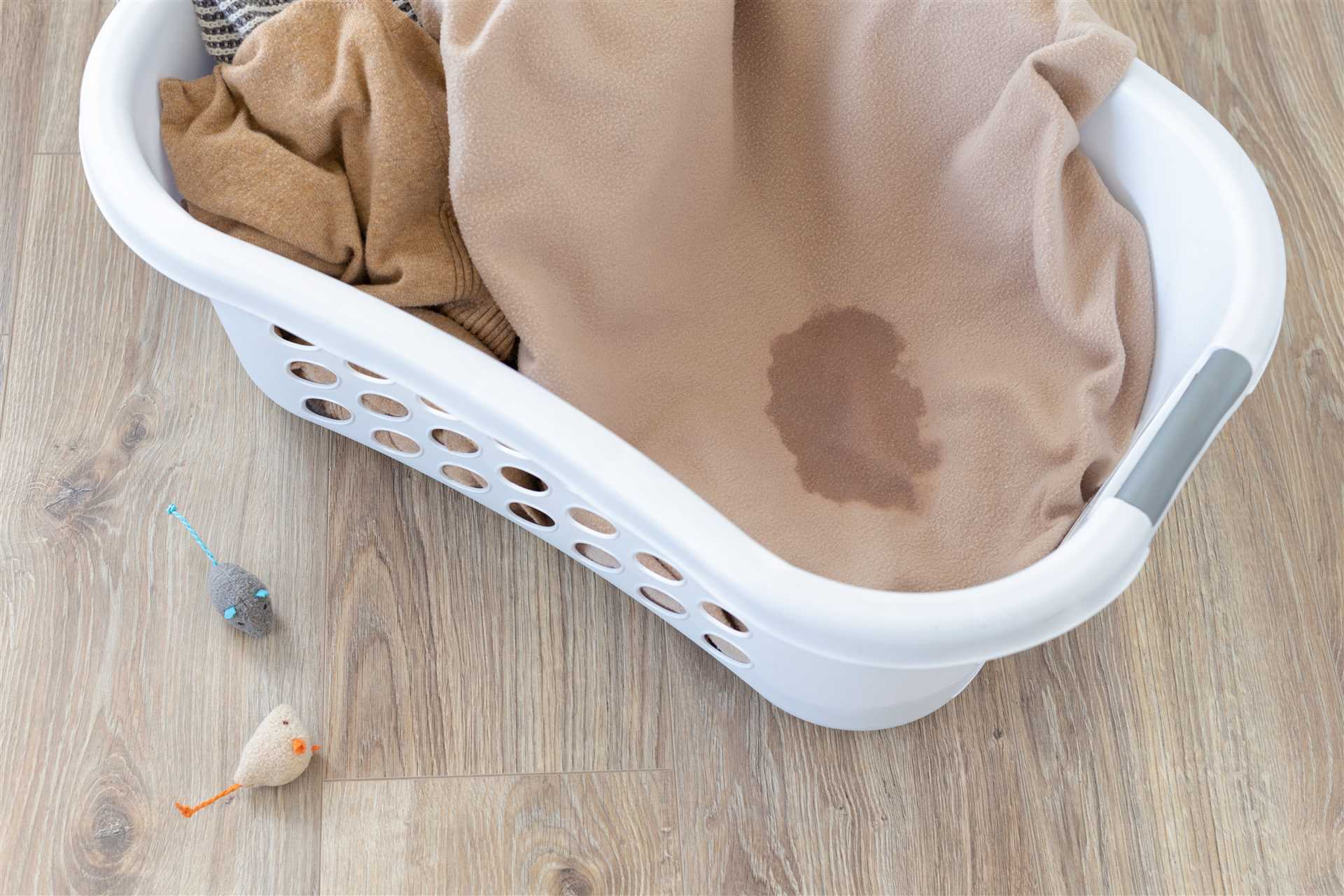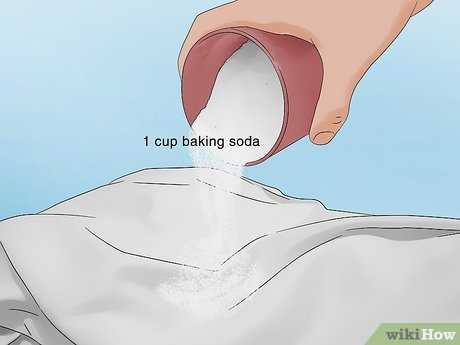

First, grab a clean cloth and blot the affected area. Avoid rubbing, as that can spread the issue further. Use a solution of equal parts white vinegar and water to neutralize the odor. Apply it gently onto the stained fabric, allowing it to sit for about 10 to 15 minutes.
Next, rinse the fabric with cold water. After rinsing, sprinkle baking soda over the damp area. This will help absorb any lingering scents. Let it sit for several hours or overnight if possible, then shake off the excess powder.
Finally, wash the fabric in the machine using the hottest water safe for the material. Adding a cup of distilled white vinegar to the wash cycle can enhance the cleaning process. Once done, air dry the item, as heat from a dryer can set any remaining odors.
Identify the Type of Fabric Before Cleaning
Knowing the fabric type is key to effective odor removal. Different materials react differently to cleaning agents. For instance, natural fibers like cotton and linen can tolerate stronger solutions, while synthetics like polyester may require gentler treatment.
Cotton and Linen
These fabrics are generally robust. You can use a mixture of vinegar and water for soaking. This combination helps neutralize unpleasant odors. Always check the care label before proceeding.
Synthetic Fabrics
For polyester or nylon, opt for a mild detergent. Harsh chemicals can damage the fibers. A simple wash with baking soda can work wonders without risking the integrity of the fabric.
Blot the Stain Immediately with Paper Towels
As soon as you notice an unwanted mark, grab some paper towels. Blot the affected area gently; do not rub, as this can spread the problem further. Press the towels against the fabric to absorb as much liquid as possible.
Make sure to use a clean section of the towel each time to prevent reapplying the liquid. Continue this process until the towels come away mostly dry. This step is crucial in minimizing any lingering odors and helps in the overall removal process.
Proper Technique
- Fold the paper towel to create a thicker pad for better absorption.
- Apply gentle pressure; avoid aggressive scrubbing.
- Work from the outside of the stain towards the center to prevent spreading.
After Blotting
Once you’ve soaked up as much as you can, it’s time to treat the fabric with a suitable cleaner. Always check the label for instructions on cleaning methods to ensure the best results.
Choose the Right Cleaning Solution for the Stain

When tackling those stubborn odors, I recommend using enzymatic cleaners specifically designed for pet-related issues. These solutions break down the odor-causing compounds, ensuring effective removal. Look for products labeled as “pet odor eliminators” or those containing enzymes like protease and amylase.
Common Ingredients to Seek
| Ingredient | Function |
|---|---|
| Enzymes | Break down organic matter and neutralize odors |
| Vinegar | Natural deodorizer and stain remover |
| Baking soda | Absorbs odors and provides gentle abrasion for cleaning |
| Hydrogen peroxide | Disinfectant and stain remover (test on fabric first) |
What to Avoid
Avoid cleaners with ammonia, as they can intensify the odor and confuse your furry friend, leading to more accidents. Always do a patch test before applying any solution to ensure it won’t damage the fabric.
For more tips on maintaining your space, check this link.
Pre-soak the fabric in a vinegar solution

Mix one part white vinegar with two parts water in a bowl. Submerge the affected material in this solution for about 30 minutes. Vinegar neutralizes odors effectively, making it a great choice for tackling stubborn scents.
Rinse thoroughly

After soaking, rinse the fabric under cold water to remove the vinegar solution. This step is crucial to prevent any lingering vinegar scent from remaining.
Proceed with washing
Once rinsed, wash the item in the machine using your regular laundry detergent. Ensure to select a suitable cycle based on the fabric type. This will help eliminate any remaining odor while also cleaning the fabric thoroughly.
Wash with enzymatic detergent for odor removal
Using an enzymatic detergent is a powerful method to tackle lingering odors from fabrics. These specialized cleaners break down organic compounds, effectively neutralizing unpleasant scents.
Steps to Use Enzymatic Detergent
- Check the fabric care label to ensure compatibility.
- Apply the enzymatic detergent directly to the affected area. Use enough to cover the stain completely.
- Gently rub the detergent into the fabric with your fingers or a soft brush.
- Let it sit for at least 15-30 minutes to allow the enzymes to work on the odor molecules.
- Wash the fabric in the warmest water safe for the material, following the instructions on the care label.
Additional Tips

- For tough odors, consider repeating the process if necessary.
- Always perform a spot test on a hidden area to avoid damage to the fabric.
- Air dry the fabric rather than using a dryer, as heat can set any remaining odors.
Use Baking Soda as a Natural Deodorizer
Sprinkling baking soda directly on the affected area is a fantastic way to neutralize unwanted odors. I recommend letting it sit for at least 15 minutes to absorb the unpleasant scents effectively.
Afterward, simply shake off the excess baking soda and check if the odor persists. For stubborn cases, repeat the process or combine it with a gentle brushing to lift any remaining particles.
Combining with Other Methods
If the odor remains, consider using baking soda alongside vinegar or enzymatic cleaners. This combination can enhance the deodorizing effect, making your fabrics fresher than before.
Final Touches
Once you’ve treated the fabric, a wash with a suitable detergent will help ensure any lingering smells are completely eradicated. This two-step approach guarantees a fresh outcome!
Air Dry and Check for Lingering Odors
After washing, allow the fabric to air dry completely. This step is crucial, as heat from a dryer can set any residual odors, making them more challenging to eliminate. Hang the item outside if possible, as fresh air and sunlight can help neutralize any remaining scent.
Inspect Thoroughly
Once dried, conduct a thorough inspection. Sniff the fabric to determine if any unpleasant scents persist. If the odor remains, you may need to repeat the cleaning process or try an alternative method. Remember, using solutions like baking soda can be beneficial during this stage as well.
Consider the Environment
Ensure the drying area is well-ventilated. This will aid in dissipating any lingering scents more effectively. If you have a favorite spot in the house for relaxing, such as a cozy corner, consider placing the fabric there to benefit from the natural airflow.
If you’re curious about the best nutrition for young felines, check out this dry kitten food for indoor cats.









